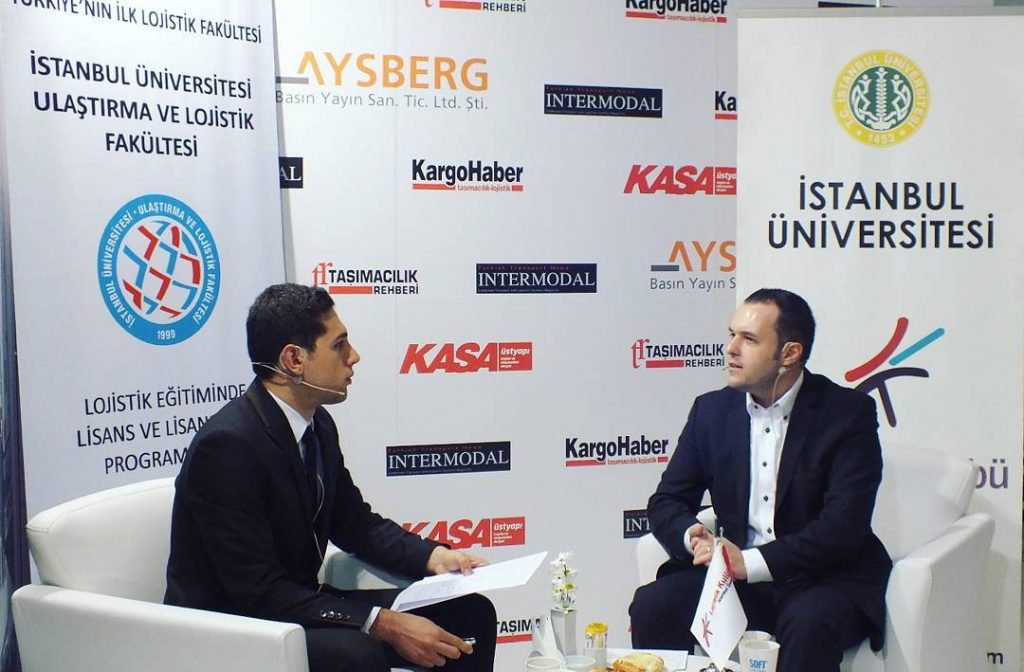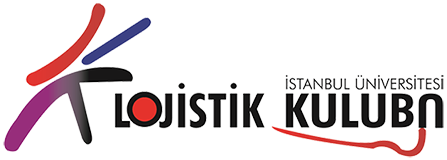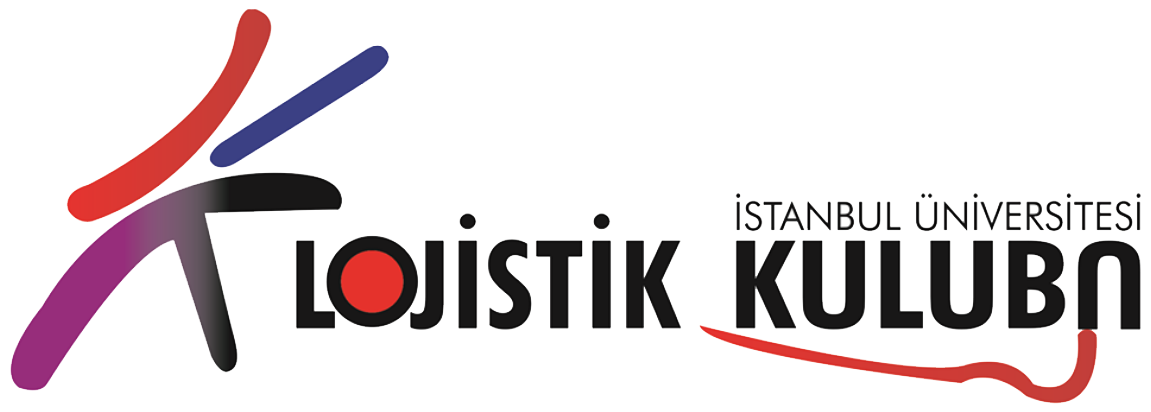“Think beyond national borders and be hungry for success!
Logistics requires open-minded professionals and connects cultures.”

Bu röportajı Türkçe okuyabilirsiniz.
During Logitrans International Transport Logistics Exhibition in Istanbul 2016, Istanbul Üniversitesi Lojistik Kulübü Emre Balcı, had the opportunity to talk with Prof. Dr. Stefan Iskan at the AYSBERG booth about logistics 4.0, the German and Turkish logistics market as well as future prospects of logistics students.
Lojistik Kulubu: Which role plays the logistics industry in Germany?
Prof. Dr. Stefan Iskan: Transport and logistics is an important industry segment in Germany. Following the automotive industry and trade, it is already the 3rd biggest industrial segment. About 3 million employees working at producing and trading companies as well as logistics service providers create a total volume of around 260bn EUR a year. Germany’s transport and logistics market volume is at the top of Europe with its estimated total volume of about 1trillion EUR.
How do you see the European logistics service provider market?
Ongoing outsourcing tendencies will drive the logistics market in Europe ahead. This is also true for Turkey when considering the recent economic developments. Producers in Turkey will face challenges in profitability and efficiency in the upcoming months and years. Therefore, the next level ot process and logistics outsourcing is just a question of time. Logistics service providers offer more and more job prospects for logistics students. They are the winners of the irresistable globalization process. The logistics service provider market shows increasing turnover. At the same time, the EBIT margins are shrinking. This is true for holding and mid-sized companies in both markets, Germany and Turkey. The profit-question is a decisive one. Especially in times of financing digitization and automating processes.
Prof. Iskan, let’s have a look on European land transport. You have a deep understanding of this market. Wich effects do you expect from the digitization?
As any other business segment, also the European land transport industry is driven by the Industrial Internet (Internet 4.0) and digitization. I am fully convinced, that digitization will change the games in European and Turkish land transport in future. It seems that a battle has just started among heavy commercial vehicle manufacturers with their telematic entities, IT companies, freight brokerage portals and major freight forwarder holdings. It is a battle with one decisive question: ‘who will be downgraded in the supply chain and who will control the network with all the freight fowarders and subcontractors at the top?‘ Just think of the UBER business model in passenger transportation. Most likely, we will see similiar models in freight operations and work with digital freight forwarders with sophisticated web-portals.
How is the Turkish logistics market positioned in Europe compared to Germany?
My recent study findings show, that the Turkish transport and logistics market has a volume of about 40-44bn EUR. This means Turkey is ranked number 7 among Europe’s leading logistics markets. The outsourcing volume, however, persists on a minor level compared to Germany. An outsourcing volume of about 50% is reached in Germany. Logistics service providers run sophisticated contract logistics solutions like light assembling, line feeding for the automotive industry, for example. From my point of view, Turkey still is dominated by warehousing activities and transportation with LTL and FTL volume. Groupage and LTL are operated via milkruns instead of domestic network structures. However, sophisticated contract logistics can be oberserved in textile and food logistics with temperature control. Furthermore, Turkey has the biggest and the state of the art land transport fleet of Europe. Turkey is the biggest production market of leight commercial vehicles and the biggest sales market for heavy commercial vehicles in Europe.
Turkey and Europe have strong business relations. How should the Turkish economy develop in future?
There are close business relationships between Turkey and Europe. Germany, for example, is an important export market of Turkey. Germany also plays a signifiicant role when it comes to import flows – after Russia and China. There are strong business ties between Europe and Turkey. From my point of view, however, Turkey has to become more independent from European business. Instead of focussing on Europe, Turkey should concentrate on growth markets in Asia, predominantly China and India as well as Russia, Turk states and near middle east up to North Africa. Achieving a high-tech status serving the entire region and the defined markets should be achieved. This means, that Turkey will also be in fierce competition with the Iranian industry after the suspended embargo. Iran currently seems to be attractive for foreign investments also from Germany.I am fully aware that the entire region around Turkey is not easy to handle– also having the current political issues in mind. We should not forget, that logistics also offers infrastructure to oil and gas in the region which are of importance for Europe. Turkey will play a big role in this game.
Logistics has become more and more professionalized over the last couple of decades. How do you see the evolution?
Logistics has undergone three major evoluation steps since the 1960s. The first is ‘TUL-logistics‘ focussing on the very basic physicial activities of transport and warehousing handling. The second meaning of logistics is ‘coordination logistics‘ which can be considered as the understanding oft he logistics service providers industry. The third one is ‘Flow Management‘ being linked to the lean philosophy and supply chain understanding of the early 1990s. Today, we can observe a fourth evaluation step: Logistics. 4.0 which is driven by the Industrial Internet and technology.
What characterizes Supply Chain Management and Industry 4.0?
Supply Chain Management is dealing with interfaces. Interfaces from an intra- and inter-organizational perspective. It means partnership, collaboration, and especially trust (data sharing) among the involved partners. The overall supply chain goal to develop a company’s ability to react on slowing-down and speeding- up markets and create transparent supply chain concept over all layers for their global production networks has not been reached yet. And exactly in this economic environment the opinion leaders on Industry 4.0 do advice the industry to go for a much more decentralized organizational modal with self-regulated units. It is not a decentral organization model, but rather a right balancing of decentral and central allocated functions and roles that need urgently to be pushed ahead in the production and supply chain network structures, for example in the automotive industry. Undoubtedly, the decentral management principle is fitting in the assembly sections and manufacturing cells within a production layout. Already by today, assembly sections in the OEM plants are able to operate self-regulated by using buffers between the single assembly cells. In this context, Industry 4.0 is already in place as is true for the entirely industrialized intra-logistics warehouse operations or automatized sea ports’ business. Professionals who really believe in a decentral management principle that is also fitting for the management of complex and global production networks in the automotive arena, should better have a look on the processes and EBIT margins of some leading European land transport network service providers. Their management seems to follow this fatal principal unteachably since decades. For sure, automotive ‘nations’ as Germany or Turkey is well advised to deal with industry 4.0. The automotive nation, however, would be much better advised to bring a professional supply chain management over all supply chain layers to life. A concept that is believed to be ‘standard’ and being ‘mastered’ in the today’s day-to-day logistics business. Frankly speaking: do we as professionals really believe in the fact that supply chain management, network management incl. end-to-end IT infrastructure and systems from OEMs via logistics service providers up to the supplier layers are in place or at least part of a company’s logistics DNA anywhere in the entire industry? If we do answer with ‘No’, how could we believe that we can skip the evolution step of ‘supply chain management’ and could directly go over to Industry 4.0 with self-regulated units & Co.? It seems that we would be good advises to run our available logistics concepts by 100% instead of following each idea that is claimed to be ‘New’.
Do you have any advice for logistics students in Turkey how to shape their professional vita?
First, do not wait until a HR department identifies your potential. Most likely, this will never happen. Instead of that, develop your professional life by yourself ahead. I do appreciate the work of your Lojistik Kulübü and you are absolutely on the right path. Lojistik Kulübü of Istanbul University tries to connect its students with industry. You need to establish a personal network that is based on mutual trust. This network will create your job opportunities. Turkey and Germany do not differ in this aspect at all. Second, having a theoretical background is good, having practical experience and challeinging theory with practice is better. Third, I recommend you to go for studying 1-2 semesters abroad if possible. If I were you, I would not prefer Germany, but any other English-speaking country like the U.S., U.K. or Canada, for example. Perfect English is a must in logistics industry. And: be open minded and do not think in borders as in Europe right now. Working in the logistics arena requires intercultural experts being able to manage people with different cultural backgrounds. And last, but not least: try to gain as much as possible practicle experience via internships during your study.
Prof. Iskan, thank you very much for sharing your thoughts with our Lojistik Kulubu.
I fully support the idea of the Lojistik Kulübü of Istanbul University. It was my pleasure and wish you and your families all the best in these challenging and decisive times Turkey has to overcome.
Information on Prof. Dr. Stefan Iskan
Prof. Iskan is best known in Germany and Turkey for his work as full-professor of Supply Chain Management and E-Business at the University of Applied Sciences in Ludwigshafen am Rhein (Germany). He is one of the most high profile experts in Industry 4.0, automotive industry, logistics management and change leadership in Germany and Turkey right now. He is author of several books and international publications, the Academic Advisor of the AYSBERG media group as well as top management advisor to holdings and mid-sized companies in the logistics and automotive industry in Germany and Turkey. Prof. Dr. Stefan Iskan formerly worked on top management level for members of the board of management of Deutsche Bahn Group (DB Schenker / DB Cargo), Daimler AG and Deutsche Post Consult. In 2015, IBM’s former top executive, president of the Business Club Stuttgart, and honorary president of the German Bundesliga.


Prof. Dr. Stefan Iskan Röportajı – Lojistik Kulübü
[…] Also available in English […]